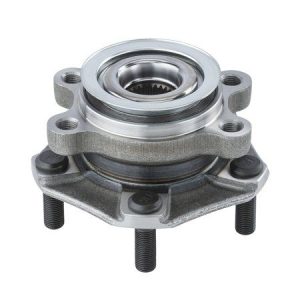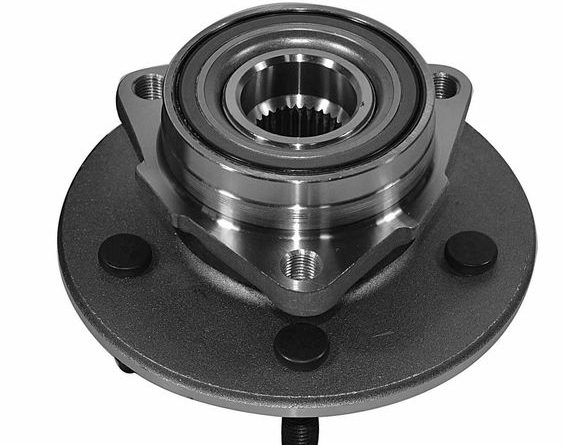How Many Wheel Bearings Does Your Car Need?
Car maintenance can feel like a complex web of parts and processes. But understanding the essential components and their roles is crucial for ensuring a safe and enjoyable driving experience. Among these vital components are wheel bearings, which play a critical role in keeping your wheels turning freely and smoothly.
This guide dives into the world of wheel, exploring how many a car typically has, their function, signs of wear and tear, and tips for maintaining optimal performance.
Demystifying Wheel Bearings: Tiny Parts, Big Impact
So, how many wheel bearings does a car typically have? While the exact number might vary slightly depending on the vehicle’s design and drivetrain configuration, most cars have four wheel , one for each wheel.

Here’s a breakdown:
- Front Wheels: Each front wheel typically has a single wheel bearing assembly. These bearings are crucial for both smooth rotation and proper steering functionality.
- Rear Wheels: Rear wheel bearings can vary depending on the vehicle’s drivetrain:
- Rear-Wheel Drive (RWD): Similar to the front, each rear wheel on an RWD car usually has its own dedicated wheel bearing assembly.
- Front-Wheel Drive (FWD) & All-Wheel Drive (AWD): In some FWD and AWD vehicles, the rear wheels might utilize a simpler bearing setup integrated into the hub assembly. Consult your owner’s manual for specifics on your car’s rear wheel bearing configuration.
Understanding the Function of Wheel Bearings: The Silent Workhorses
Wheel bearings are essentially precision-engineered sets of balls or rollers encased within a housing. They serve two critical functions:
- Minimize Friction: Wheel enable the wheels to spin freely with minimal resistance, reducing friction between the axle and the wheel hub. This allows for smoother operation and improved fuel efficiency.
- Support Weight: Wheel bear a significant load, supporting the weight of the vehicle and any cargo while allowing the wheels to rotate freely.
Signs Your Wheel Bearings Need Attention: Don’t Ignore the Warnings
Wheel bearings are typically designed to last for a long time, but like any mechanical component, they can wear out over time. Here are some telltale signs that your wheel might require attention:

- Unusual Noises: A grinding or growling noise emanating from the wheels, particularly during turns or when accelerating, can be a sign of a failing wheel bearing. The noise may become louder and more pronounced as the bearing wears further.
- Vibrations in the Steering Wheel: If you feel a vibration in the steering wheel, especially at higher speeds, it could indicate a worn wheel bearing. This vibration can be caused by uneven wear or damage within the bearing.
- Uneven Tire Wear: Premature or uneven tire wear on one specific wheel can sometimes be a symptom of a failing wheel bearing. The bearing may not be allowing the wheel to rotate smoothly, leading to abnormal wear patterns on the tire.
- Loose Wheel Play: In severe cases of bearing wear, you might experience a slight looseness in the wheel when attempting to rock it back and forth. This is a serious safety concern and requires immediate attention from a qualified mechanic.
Don’t Let Worn Bearings Hinder Your Ride: Replacing When Necessary
Ignoring the signs of failing wheel bearings can lead to further damage and even a complete bearing failure while driving. This can be a dangerous situation, potentially causing loss of vehicle control.
If you suspect a problem with your wheel bearings, it’s crucial to have your car inspected by a qualified mechanic as soon as possible. Replacing worn wheel is a relatively straightforward repair for most experienced mechanics.
Here are some additional points to consider when dealing with wheel bearing replacement:

- Replacing in Pairs: While it might be tempting to replace a single failing bearing, it’s generally recommended to replace both bearings on the same axle (front or rear) at the same time. This ensures even wear and prevents premature failure of the remaining bearing.
- Consult a Professional: Replacing wheel bearings requires specialized tools and knowledge. It’s best to leave this task to a qualified mechanic who can ensure the job is done correctly and safely.
Preventive Maintenance: Keeping Your Wheel Bearings Rolling Strong
While there’s no guaranteed way to prevent wheel bearing wear entirely, several practices can help extend their lifespan:
- Maintain Proper Tire Pressure: Uneven or underinflated tires can put additional stress on the wheel bearings. Regularly check your tire pressure and inflate them to the recommended level as specified in your owner’s manual.
- Avoid Road Hazards: Potholes, curbs, and other road hazards can damage wheel. Be observant and avoid these hazards whenever possible.
- Schedule Regular Maintenance: Regular maintenance inspections by a qualified mechanic can help identify potential wheel bearing issues early on, allowing for preventative measures or timely replacement before a more serious problem arises.
Investing in Smooth Rolling: The Importance of Healthy Wheel Bearings
Healthy wheel bearings are essential for a safe and enjoyable driving experience. They ensure smooth wheel rotation, minimize friction, and support the weight of the vehicle. By understanding their function, recognizing the signs of wear, and practicing preventive maintenance, you can keep your wheel bearings rolling strong for miles to come.

Remember:
- Most cars have four wheel bearings, one for each wheel.
- Wheel bearings minimize friction and support the weight of the vehicle.
- Signs of failing wheel bearings include unusual noises, vibrations, uneven tire wear, and loose wheel play.
- Replace worn wheel bearings promptly to avoid further damage and safety hazards.
- Consider replacing bearings in pairs and consult a professional for the repair.
- Maintain proper tire pressure, avoid road hazards, and schedule regular maintenance to extend wheel bearing lifespan.
Don’t let worn bearings slow you down! Schedule a checkup with your mechanic today to ensure your wheels are rolling smoothly and safely.
Finding the Right Mechanic for Your Wheel Bearing Needs
Having a reliable mechanic you trust is essential for maintaining your car’s overall health and safety. Here are some tips for finding a qualified mechanic to handle your wheel bearing replacement:

- Seek Recommendations: Ask friends, family, or fellow drivers for recommendations on reputable mechanics in your area.
- Check Online Reviews: Read online reviews of local mechanics to get a sense of customer experiences and satisfaction.
- Look for Certifications: Consider mechanics who are certified by organizations like the National Institute for Automotive Service Excellence (ASE).
- Get Quotes: Before committing to a repair, get quotes from several mechanics to compare prices and services offered.
By following these tips, you can find a qualified mechanic who can diagnose any wheel bearing problems accurately and provide a safe and reliable repair.
The Road to Smooth Sailing: A Final Word on Wheel Bearings
Wheel bearings are silent partners in ensuring a smooth and safe driving experience. By understanding their role, maintaining vigilance for signs of wear, and prioritizing proper maintenance, you can keep your wheels rolling freely for miles to come.
Invest in your safety – prioritize healthy wheel bearings!
